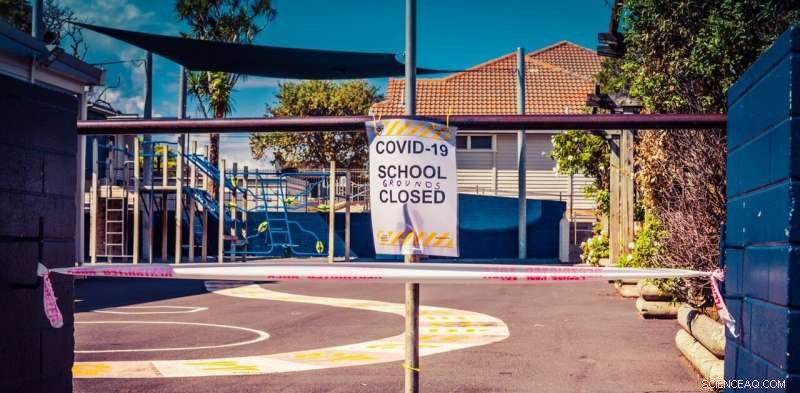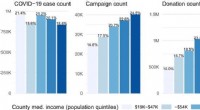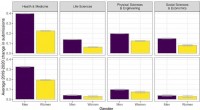Hvordan har NZ-vaccinerede lærere de hårde samtaler med deres anti-vax-kolleger?

Kredit:Shutterstock
Nyheden om, at alle ansatte på en lille King Country-skole stadig var uvaccineret en uge efter regeringens obligatoriske deadline den 15. november, understreger, hvor udfordrende de kommende uger kan være.
Næste mandag markerer dagen, at lærere skal have modtaget mindst én dosis af COVID-19-vaccinen, hvis de vil fortsætte med at arbejde med elever i et læringsmiljø ansigt til ansigt.
Det bliver også den dag, hvor pædagogiske ledere med en vis sikkerhed finder ud af, hvem deres vaccine-tøvende kolleger er, og hvornår mange engagerede pædagogers karriereveje står til en skillevej.
Da det ser sandsynligt ud, at nogle skoler vil stå over for betydelig personalemangel, må lærerprofessionen nu for alvor kæmpe med, hvordan man demonstrerer værdien af manaakitanga for alle kolleger, inklusive de uvaccinerede.
COVID-19 :Alt personale på den lille King Country-skole nægter vaccine inden næste uges deadline https://t.co/fDKGzVpbj9
— RNZ News (@rnz_news) 8. november 2021
Ansvarskodeksen
Som fuldt registreret lærer (såvel som akademiker) vil jeg være fri til at undervise i newzealandske skoler, hvis alarmniveauet tillader det, fordi jeg er dobbeltvaccineret. Men jeg ved, at det ikke er tilfældet for nogle af mine meget talentfulde og engagerede kolleger, der har nægtet Pfizer-jabben.
Jeg kan kun forestille mig de professionelle identitetskriser, som disse kolleger må opleve.
Jeg tænker på de lærere, der oprigtigt tror på, at de respekterer deres forpligtelse til samfundet – som er anført i Teaching Council of Aotearoa New Zealand (TCANZ) Code of Professional Responsibility – ved at stå op for newzealændernes menneskerettigheder til kropslig autonomi.
Jeg tænker på de lærere, der lidenskabeligt tror på, at de respekterer deres engagement i samfundet ved at udvise den etiske integritet til at stå op mod en magt, som de mener vildleder offentligheden.
Jeg tænker på de lærere, der mener, at de "taler om" en kritisk reflekterende behandler ved at nægte at blive vaccineret.
Og jeg tænker på mit eget engagement over for disse lærere som mine professionelle kolleger, på trods af min grundlæggende uenighed med deres anti-vaccinationsoverbevisning.
Undervisning som en etisk aktivitet
TCANZ-vejledningen for lærere – vores kodeks, vores standarder – skitserer alle læreres etiske forpligtelser. The council recognizes that for the code to be "owned," the professional commitments should not be seen as a list of prescribed rules.
Rather, it is a set of agreed aspirations that encourage collaborative conversations between practitioners about the ethical nature of their work.
There is no doubt the vaccine mandate will demand some of the most ethically challenging conversations teachers from both vaccination camps will have in their professional careers.
However, that's no reason to shy away from collegial awkwardness. One of New Zealand's pre-eminent educational thinkers, the late Ivan Snook, believed teaching is an innately ethical activity as it involves close personal relationships, not least between colleagues.
Snook also provides us with some wise guidance on how we might go about these challenging discussions. He addresses the fundamental tension teachers face when trying to persuade others to take a on a point of view they believe is demonstrably rational.
Snook frames this tension as the "conflicting obligations to respect the learner's state of mind and also move her towards a more adequate understanding and a more enlightened practice."
An ethic of care
As colleagues in discussion with those who disagree with us on the vaccine mandate, we must be ready to respect the ethical integrity of alternative viewpoints, while providing rational alternatives based on reputable scientific evidence.
Nor should we decry those who distrust authority. As Snook argues, a major task of educators is to help others come to understand the importance, and limitations, of all authorities.
It is my hope that over the next few months we will see the code truly become "our code" as it guides vaccinated and unvaccinated teachers to have these respectful conversations about what it is to be a critically reflective, ethical teacher in a society in the grip of a global pandemic.
But if the code is to guide teachers through these difficult conversations it needs to be used with care. If it's simply a weapon of entrenched positions there is nothing to be gained.
Educational philosopher Nel Noddings said conversations of this complexity need to happen within an "ethic of care" that is sensitive to the relationships in which we must all continue to live.
In the spirit of whanaungatanga, I encourage my vaccinated and unvaccinated colleagues to be courageous and use the code to discuss the vaccine mandate within such an ethic of care.
Let us decide together what that is, and what it means to be an ethical teacher in Aotearoa New Zealand in this watershed moment for our profession.
 Varme artikler
Varme artikler
-
 Hvordan adfærdsvidenskab kan hjælpe os med at forstå menneskelig adfærd under en pandemiLeder du efter tørret pasta, madolie eller krydderier? Du er ikke alene. Kredit:Christopher Corneschi/Wikipedia, CC BY-SA Når dagen kommer, hvor COVID-19-pandemien aftager, en af de ting, der vi
Hvordan adfærdsvidenskab kan hjælpe os med at forstå menneskelig adfærd under en pandemiLeder du efter tørret pasta, madolie eller krydderier? Du er ikke alene. Kredit:Christopher Corneschi/Wikipedia, CC BY-SA Når dagen kommer, hvor COVID-19-pandemien aftager, en af de ting, der vi -
 Crowdfunding fra pandemien er mere almindelig, succes i velhavende samfundDisse søjlediagrammer viser forskelle i oprettelse af crowdfunding-kampagner, blandt andre forskelle, efter amternes medianhusstandsindkomst. Kredit:Igra et al., 2021, Samfundsvidenskab og medicin
Crowdfunding fra pandemien er mere almindelig, succes i velhavende samfundDisse søjlediagrammer viser forskelle i oprettelse af crowdfunding-kampagner, blandt andre forskelle, efter amternes medianhusstandsindkomst. Kredit:Igra et al., 2021, Samfundsvidenskab og medicin -
 Kønsforskelle afsløret i indsendelser af akademiske tidsskrifter under den første COVID-19-bølgeGennemsnitlig ændring i afleveringer efter forskningsområde og alder, sidstnævnte variabel inkluderer forfattere i den første kohorte (≤ 20 år fra deres første udgivelse) i den første gruppe med ældre
Kønsforskelle afsløret i indsendelser af akademiske tidsskrifter under den første COVID-19-bølgeGennemsnitlig ændring i afleveringer efter forskningsområde og alder, sidstnævnte variabel inkluderer forfattere i den første kohorte (≤ 20 år fra deres første udgivelse) i den første gruppe med ældre -
 Unge føler sig svigtet af politikere og mediernes stereotyper, siger ny forskningKredit:CC0 Public Domain Beslutningstagere formår ikke at udnytte de unges potentiale til at hjælpe med at forme pandemiske reaktioner, ifølge en større undersøgelse, der viser unge menneskers syn
Unge føler sig svigtet af politikere og mediernes stereotyper, siger ny forskningKredit:CC0 Public Domain Beslutningstagere formår ikke at udnytte de unges potentiale til at hjælpe med at forme pandemiske reaktioner, ifølge en større undersøgelse, der viser unge menneskers syn
- Facebook streamer 25 MLB -spil i en eksklusiv aftale
- Flour power:Hvordan shoppere vælger hvilket brød de skal købe
- En hierarkisk RNN-baseret model til at forudsige scenediagrammer for billeder
- Generativitet:Unge aktivister motiveres af bekymring for fremtidige generationer
- Det fedeste eksperiment i universet
- Er du ivrig efter at farve dit hår med ikke -giftige grafen -nanopartikler? Ikke så hurtigt!


